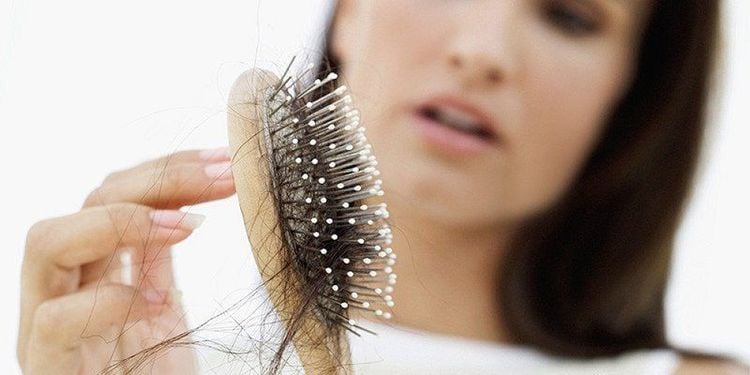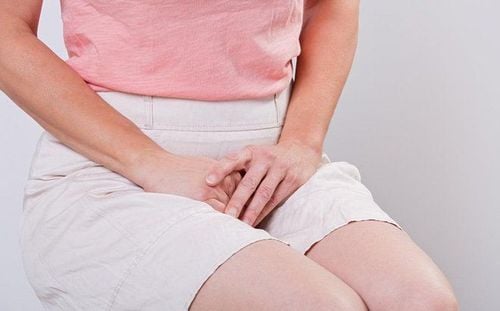This is an automatically translated article.
About half of all menopausal women report finding it difficult to manage menopausal symptoms. These symptoms include, fatigue, headache, hot flashes, night sweats, memory impairment, loss of concentration, or fatigue.
Here are 10 ways to help you cope with the uncomfortable symptoms of menopause.
1. Remember the frequency of hot flashes
Hot flashes are one of the most common symptoms in menopausal women. Keep in mind how often hot flashes occur in a day.
Hot flashes can be caused by many different factors, such as: Alcohol, beer, caffeine, sleeping in a hot and cold room, or stress. When you notice signs of hot flashes starting, slowly inhale deeply through your nose and exhale slowly through your mouth.
In case, hot flashes cause certain disadvantages when performing certain daily activities, menopausal women should see a doctor for advice and consider measures to overcome them.

Phụ nữ bước vào thời kì mãn kinh rất dễ bốc hỏa
2. Limit night sweats
Night is the best time for hot flashes to appear. They usually last more than 3 minutes and cause profuse sweating, which greatly affects the quality of sleep.
To improve this problem, you should keep your bedroom cool, wear thinner clothes, often turn pillows and lie on the cooler side. In addition, you should also choose thin blankets instead of using thick blankets.
Night sweats can be greatly improved by placing a fan next to the bed to regulate the air and temperature in the room.
3. Enhance sleep
Some studies show that practicing yoga, meditation or tai chi can help menopausal women fall asleep more easily. Although exercise has many health benefits, you should stop this activity about 3 hours before going to bed.
Also, you should not use alcohol before going to bed, as it can make you wake up later the next day. Instead of drinking alcohol, you should sip a glass of warm milk. Certain substances in milk will help you feel more relaxed and sleep better.
If you still can't sleep, read a few pages until you're really sleepy. In case the above methods are not effective, you should seek help from your doctor to have other better measures.

Giấc ngủ ngon giúp cải thiện những triệu chứng ở thời kì mãn kinh
4. Improve your sex life
Menopause causes women's hormones to decline, making the vagina dry and thinner, causing pain during sex. However, you should not worry too much about this condition. Today, there are many lines of over-the-counter products, including vaginal lubricants and moisturizers, that significantly improve cases of vaginal dryness in menopausal women.
5. Increase sex drive
Menopausal women often experience a decrease in libido, so they should spend more time sex at this stage. Massage combined with foreplay will help boost sex drive for both of you.
Several factors can decrease a woman's sex drive, including hormonal changes, insomnia, urinary tract problems, stress or mood swings. When these symptoms appear, you should see a doctor for timely advice.

Phụ nữ bước vào thời kì mãn kinh thường giảm ham muốn tình dục
6. Control mood swings
Mood swings in menopausal women with symptoms similar to premenstrual syndrome (PMS) include: Stress, irritability, mixed happiness, crying or irritability. If you've had PMS before, the hormonal changes that occur during this time can lead to even greater mood swings.
Tai chi and yoga would be suitable options for menopausal women to manage mood swings. You should also regularly participate in group activities, exchange and talk more with friends or family members.
7. Reduce headaches
Migraines may get worse when they first appear or around the time of menopause. You should find out what is causing the headache symptoms.
If the headache is caused by hunger, you should eat several small meals a day. In the case of headaches caused by insomnia, take a nap during the day to make sure you get enough sleep.
8. Prevents hair loss
Your hair seems to become thinner and more prone to breakage around the time of menopause. To prevent hair breakage, you should switch to healthy hair care products that do not contain many chemical ingredients or harsh detergents. Besides, you need to protect your hair from harmful ultraviolet rays from the sun, and limit drying.

Tóc rụng nhiều là một triệu chứng của phụ nữ ở thời mãn kinh
9. Preventing menopausal acne
Although acne is common in adolescence, it can appear during menopause in women. Therefore, you should use sunscreens, moisturizers, cleansers or other skin care products that are gentle, not irritating to the skin. When choosing products, you should pay attention to keywords like “oil free” – not oily, “won’t clog pores” – not clog pores, and “non-acnegenic” – non-comedogenic. .
10. Enhance memory
Hormonal changes during menopause can make women feel stressed, distracted, even memory impaired. To improve your memory, you can challenge your brain by learning a new language or hobby.
Any questions that need to be answered by a specialist doctor as well as customers wishing to be examined and treated at Vinmec International General Hospital, you can contact Vinmec Health System nationwide or register online HERE.
Reference source: webmd.com
MORE
Body changes during perimenopause and menopause What age is considered early menopause? Late menopause: Good or bad?













